小升初英语总复习 四大时态综合课件(99张PPT)
文档属性
| 名称 | 小升初英语总复习 四大时态综合课件(99张PPT) | 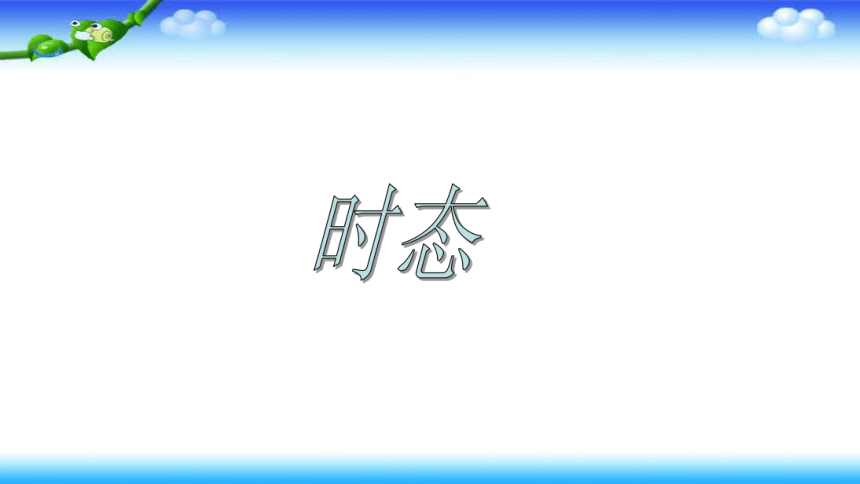 | |
| 格式 | pptx | ||
| 文件大小 | 2.5MB | ||
| 资源类型 | 教案 | ||
| 版本资源 | 人教版(PEP) | ||
| 科目 | 英语 | ||
| 更新时间 | 2021-04-22 22:09:10 | ||
图片预览

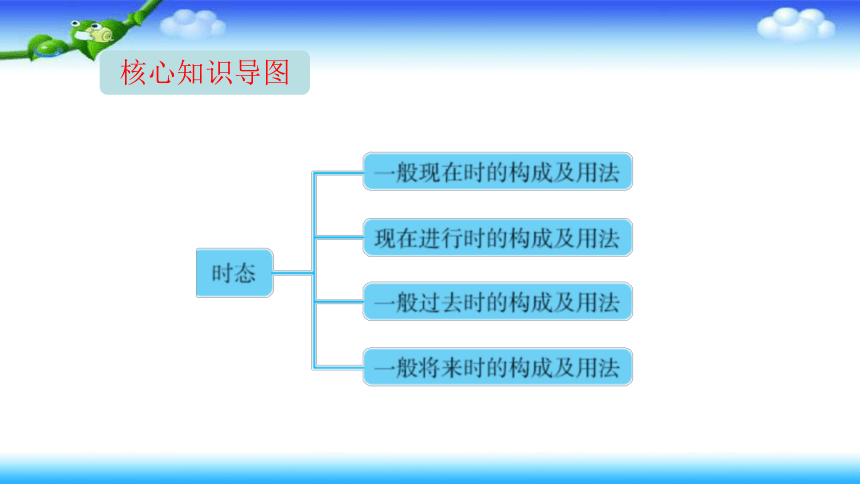
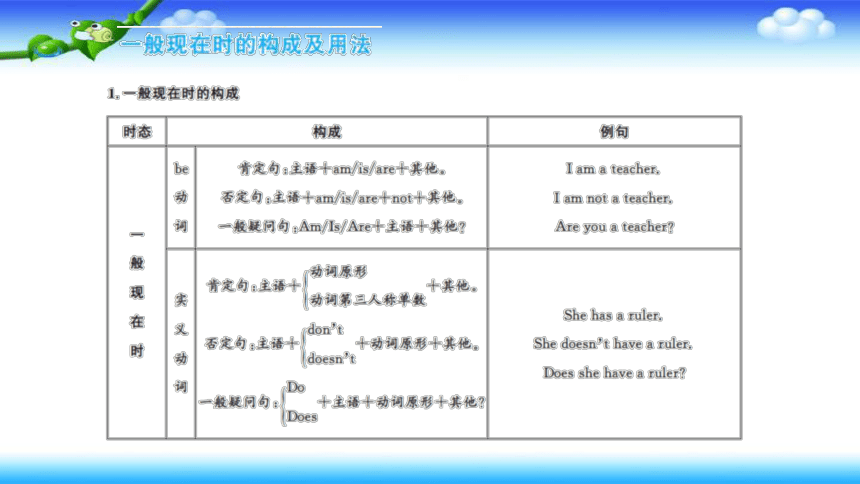
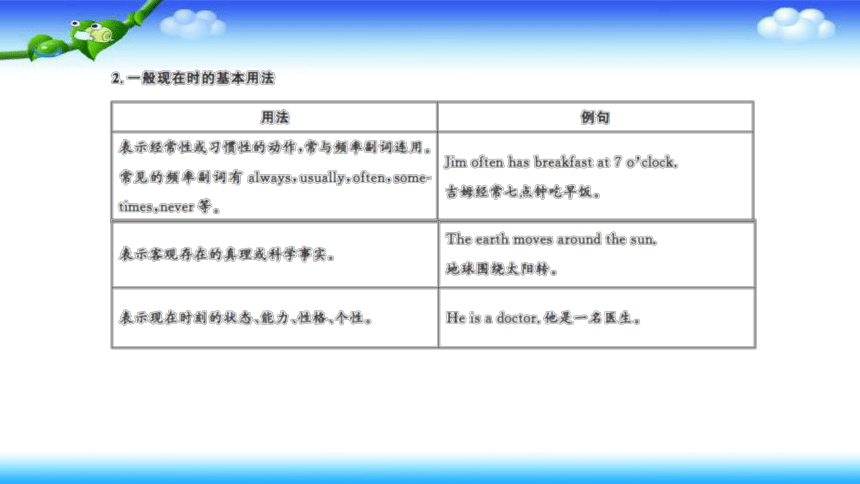
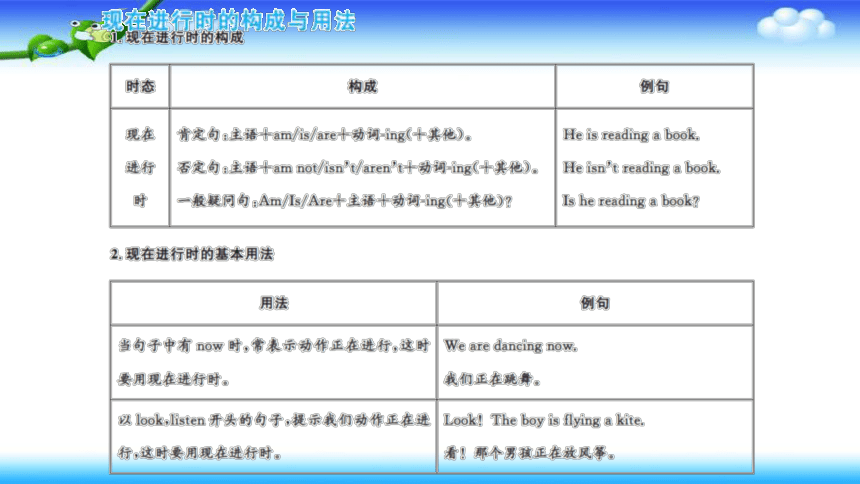
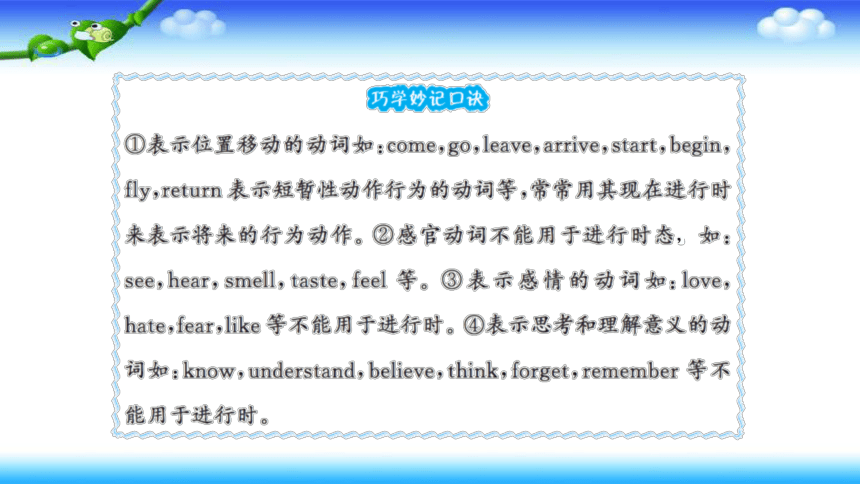
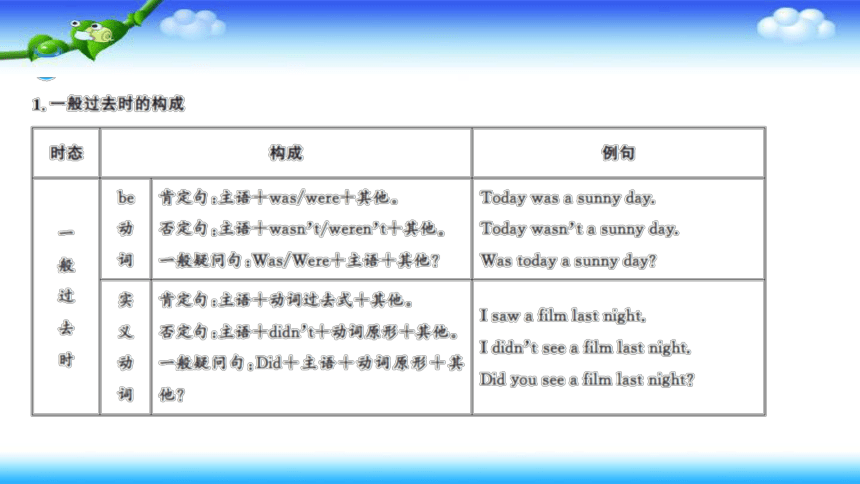
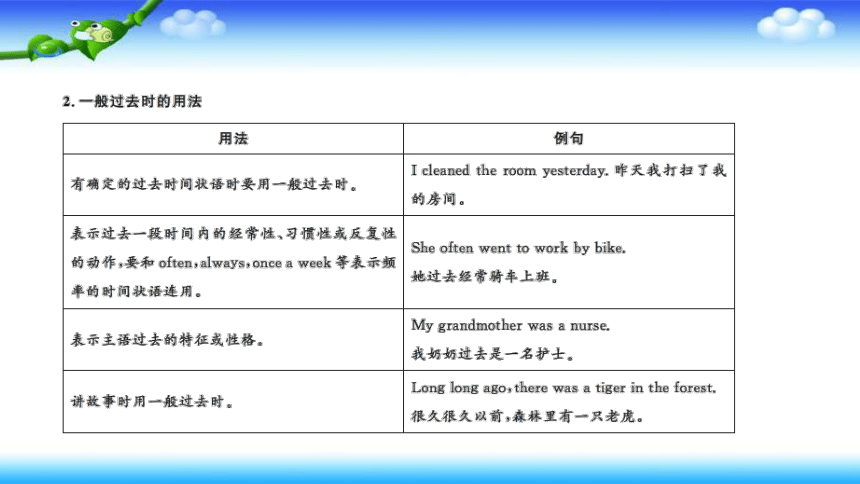
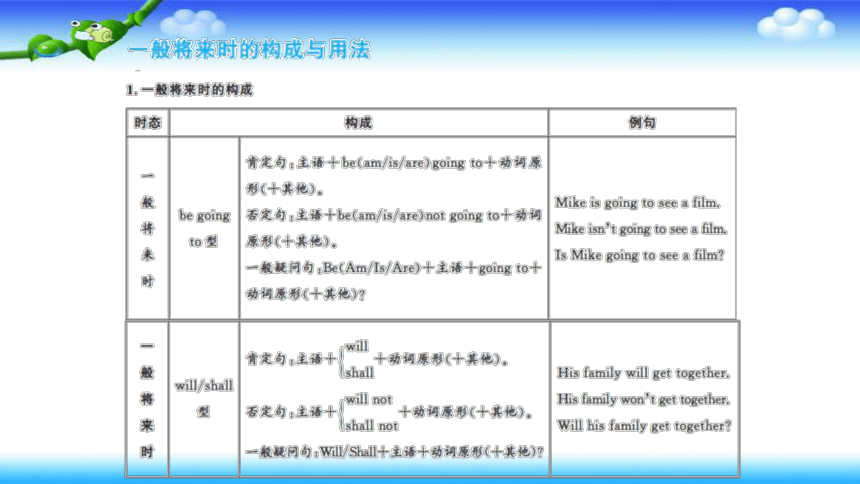
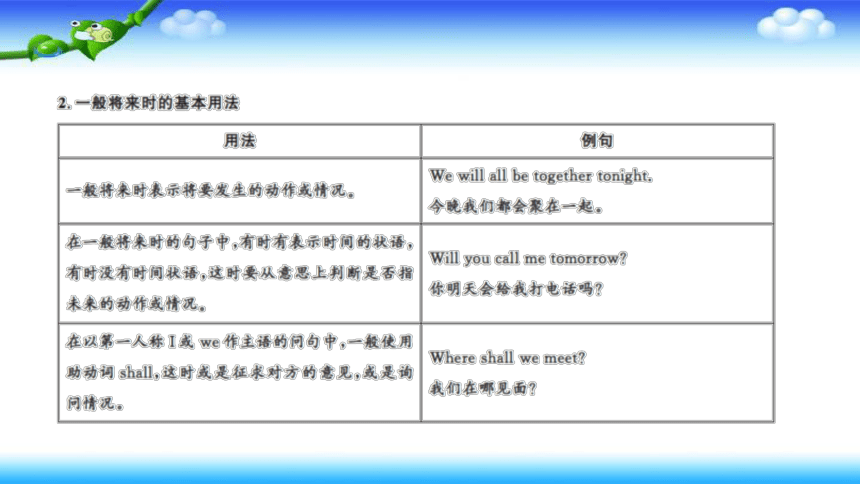
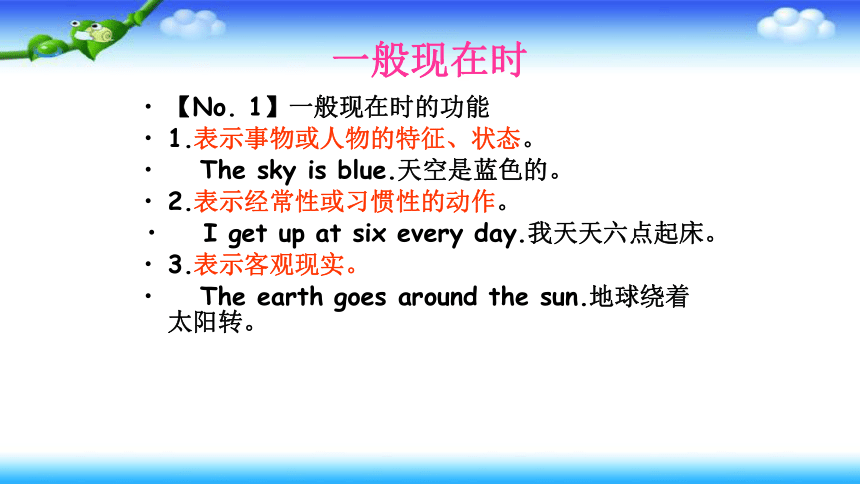
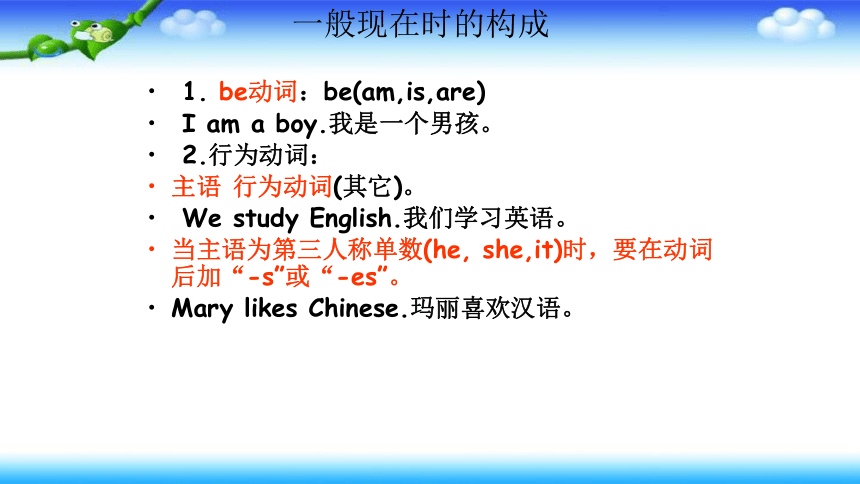
文档简介
时态
核心知识导图
一般现在时
【No. 1】一般现在时的功能
1.表示事物或人物的特征、状态。
The sky is blue.天空是蓝色的。
2.表示经常性或习惯性的动作。
I get up at six every day.我天天六点起床。
3.表示客观现实。
The earth goes around the sun.地球绕着太阳转。
一般现在时的构成
1. be动词:be(am,is,are)
I am a boy.我是一个男孩。
?2.行为动词:
主语 行为动词(其它)。
?We study English.我们学习英语。
当主语为第三人称单数(he, she,it)时,要在动词后加“-s”或“-es”。
Mary likes Chinese.玛丽喜欢汉语。
【No. 2】一般现在时的变化
1. be动词的变化
否定句:主语+be not+其它.
He is not a worker.他不是工人。
一般疑问句:Be+主语+其它?-Are you a student?
-Yes. I am. / No, I'm not.
特殊疑问句:疑问词+一般疑问句?
Where is my bike?
2.行为动词的变化。
否定句:主语+don‘t(doesn’t )+动词原形(其它).
? I don‘t like bread.
????? 当主语为第三人称单数时,要用doesn’t
构成否定句。
He doesn't often play.
一般疑问句:Do(Does)+主语+动词原形+其它?
????? - Do you often play football?
????? - Yes, I do. / No, I don‘t.
????? 当主语为第三人称单数时,要用does构
成一般疑问句。
????? - Does she go to work by bike?
????? - Yes,she does. / No, she doesn't.
动词 s的变化规则
1.一般情况下,直接加-s,
如:cook-cooks, milk-milks
2.以s. x. sh. ch. o结尾,加-es,
如:guess-guesses, wash-washes, watch-watches, go-goes
3.以“辅音字母 y”结尾,变y为i, 再加-es,
如:study-studies
现在进行时
?1.现在进行时表示现在正在进行或发生的动作,也可表示当前一段时间内的活动或现阶段正在进行的动作。
2.肯定句基本结构为be 动词ing.
???? 否定句在be后加not
????? 一般疑问句把be动词调到句首
???? 动词加ing的变化规则
1.一般情况下,直接加ing;
如:cook-cooking
2.以不发音的e结尾,去e加ing;
如:make-making, taste-tasting
3.假如末尾是一个元音字母和一个辅音字母,双写末尾的辅音字
母,再加ing。
如:run-running,stop-stopping
将来时
概念:表示将要发生的动作或存在的状态及打算、计划或预备做某事。句中一般有以下时间状语:tomorrow, next day(week, month, year…),soon, the day after tomorrow(后天)等
基本结构:①be going to do
????? ②will do
否定句:在be动词(am, is, are)后加not
或情态动词will后加not成won’t。
?I’m going to have a picnic this afternoon.
→ I’m not going to have a picnic this afternoon.
??同义句:be going to = will
? I am going to go swimming tomorrow
= I will go swimming tomorrow.
一般过去时
1.一般过去时表示过去某个时间发生的动作或存在的状态,常和
表示过去的时间状语连用。一般过去时也表示过去经常或反复发
生的动作。
2.Be动词在一般过去时中的变化:
⑴am 和is在一般过去时中变为was。(was not=wasn’t)
⑵are在一般过去时中变为were。(were not=weren’t)
3.句中没有be动词的一般过去时的句子
否定句:didn’t 动词原形,
如:Jim didn’t go home yesterday.
动词过去式变化规则
1.一般在动词末尾加-ed;
如:work-worked, cook-cooked
2.结尾是e加d;
如:live-lived
3.末尾只有一个元音字母和一个辅音字母的重
读闭音节,应双写末尾的辅音字母,再加-ed;
如:stop-stopped
4.以“辅音字母 y”结尾的,变y为i,再加-ed。
如:study-studied
不规则动词过去式
am, is-was are-were
do-did swim-swam
see-saw sit-sat
say-said give-gave
get-got go-went
come-came have-had,
eat-ate take-took,
run-ran sing-sang,
put-put make-made,
read-read write-wrote,
draw-drew drink-drank,
1.一般现在时
(1)表示经常发生或习惯性的动作或状态
We?often?write?to?each?other.
常与always,usually,often,sometimes…连用。
(2)表示主语现在的性格、特征、能力
He works hard.他努力工作
(3)表示客观事实或普遍用法
The sun rises in the east.
Light goes faster than sound
2.一般过去时
(1).表示过去某一时间点发生的动作或所处的状态.
He arrived in Hangzhou an hour ago.
Where were you just now?
(2).一般过去时往往和明确的过去时间状语连用.
yesterday, last night, at that time
two days (months weeks) ago, in 1996 …
????? My father, when he was a child, worked 15
hours for the farm a day.
过去时的几种句型
1)肯定句:主语+动词的过去式+其它.
He went to the toy store yesterday.
2)否定句:主语+did not (didn‘t)+动词原形+其它.
He didn't go to the toy store yesterday.
3)一般疑问句:Did+主语+动词原形+其它?
-Did you go to Beijing last week?
-Yes, we did. (No, we didn't.)
4)特殊疑问句
疑问词+did+主语+动词原形+其它?
-What did you do last night?
-I did my homework.
3.一般将来时
(1) 构成
a. will +动词原形
b. be going to + 动词原形
(2) 用法
表示将要发生的动作或存在的状态。
1.will常缩写成"'ll“
2.否定式will not的简略形
式为won't
4.现在进行时
(1)意义:
表示说话的此刻正在进行的动作。 常与now连用。
The students are playing basketball now.
(2)构成:主语+be+现在分词(v-ing).
Listen! Mary is singing an English song in the classroom.
How many tenses do you know?
the simple present tense 一般现在时
the present continuous tense 现在进行时
the simple past tense 一般过去时
the simple future tense 一般将来时
Grammar
结构:
标志语:
主语+ 动词(原形/第三人称单数)
often, always, usually, sometimes, once a week
等表示频度的副词和时间状语
Simple present tense
第三人称单数
The present continuous tense
现在进行时
The present continuous tense
现在进行时
基本用法
1.表示现在正在进行的动作和发生的事
e.g. -What are you doing?
-I am reading a book.
2.有时表示现阶段正发生的事,但此刻动作不一定正在进行
e.g. He is teaching at the school.
We are learning Unit 5 these days.
3.现在进行时的句子中常有now,或在句首常出现
Look! Listen!等提示词
e.g. Listen! Danny is singing in the room.
He is doing his homework now.
结构: be+doing (be要根据主语作人称和数的变化)
句型转换
1.肯定句转换成否定句,要在 be 后加 not 构成
e.g. We are reading English now.
We are not reading English now.
2.陈述句转换成一般疑问句,把be动词提到句首
e.g. The student is drinking.
Is the student drinking?
3.陈述句转换成特殊疑问句,由“疑问词+一般疑问句”构成
e.g. He is working.
What is he doing?
walking
riding
drawing
jumping
diving
dancing
climbing
playing
What is he/she doing? He’s/She’s …
v.+ing
sleep
stand
sweep
wash
sleeping
standing
sweeping
washing
clean
jump
walk
do
cleaning
jumping
walking
doing
running
swim
swimming
run
sit
sitting
dancing
closing
riding
having
双写+ing 以动词闭音节结尾,且末尾只有一个辅音字母的,应双写此字母,再加 –ing
dance
close
e+ing 动词末尾有不发音的e ,则去e加 -ing
ride
have
口诀教你学doing
进行时很好记,be加动词-ing;
直接双写去哑e,分词构成须仔细;
别说 be 无词义,主语和它最亲密;
变疑问 be 提前,否定 not 再后添;
何时要用进行时 look,listen,now标记。
The simple past tense
一般过去时
一般过去时(simple past tense)表示
过去某个时间里发生的动作或状态;
过去习惯性、经常性的动作、行为;
过去主语所具备的能力和性格。
The simple past tense
基本结构: 主语+动词过去式+其他
The simple past tense
时间状语
ago—two hours ago, three days ago
yesterday, the day before yesterday
last week/year/night/month…
just now, long ago, once upon a time
The simple past tense
否定形式
① was/were+not;
② 在行为动词前加didn't,同时还原行为动词
一般疑问句
Did+主语+do+其他+?
She often came to help us last year.
I was not a teacher five years ago.
I didn't know you were so busy just now.
Did you go to school yesterday?
动词变化规则
规则变化:
1.直:直接加ed: work- worked ,
2.去:以e结尾的,去e加ed: live - lived
3 双:以重读闭音节结尾的,双写加ed: stop stopped
4 改:以辅音字母+y结尾的,变y为i加ed: study-studied
直去双改
动词变化规则 —不规则变化:
have/has — had
eat—ate
see—saw
am/is—was
are—were
go—went
do—did
take—took
run—ran
sit—sat
feel—felt
get—got
meet—met
catch—caught
buy—bought
think—thought
say—said
give—gave
put—put
write—wrote
swim—swam
keep—kept
sleep—slept
read—read
动词不定式(to do)
短语:
want to do remember to do sth
begin to do like to do
forget to do
句型:
It’s time for sb to do sth.
I am glad to do sth.
I am sorry to do sth.
Would you like to do sth?
动名词 doing
like doing sth
forget doing sth
stop doing sth
remember doing sth
be good at doing sth
go shopping / fishing / skating / jogging
The Simple Future Tense
一般将来时
一般将来时 (the future tense)
一般将来时表示在将来某一时间将要发生的动作或存在的状态,也可表示将来某一段时间内经常发生的动作或存在的状态。它常接表示将来的时间状语,如soon,tomorrow,next week,in a few days,the day after tomorrow,this evening等。
结构:be going to +动词原形will +动词原形
be going to 结构:
1定义:
3结构:
2标志:
4例句:
表示将要发生的动作,含有“打算”的意思。
tomorrow , next week/Sunday , this evening…
主语 + be going to + 动词的原形
She is going to play football.
He is going to go fishing.
It is going to do its homework.
next week
What is he going to do next week?
He is going to go fishing.
What are they going to do tomorrow ?
They are going to play basketball.
我们除了用“be going to+动词原形”表示一般将来时外,我们还可以用 表示一般将来时。
“will+动词原形”
will 引导的一般将来时:表示将来发生的动作或存在的状态,最基本的结构:
will + 动词原形
e.g.
I will go to university after six years .
六年后我将上大学了。
一般将来时的标志:will
Finish the sentences
肯定句 Students will go to school in the future.
主语+ will +动词原形+(宾语)+其他
改为否定句:____________________________
在will 的后面加not即可。will not 可缩写为 won’t
改为一般疑问句:____________________________________
把will 提到句子主语之前,结尾变问号。
针对Students改为特殊疑问句:____________________________________
特殊疑问词+will +主语+动词原形+其他?
Students won’t go to school in the future.
Will students go to school in the future?
Who will go to school in the future?
Exercise
历年真题:
1. That man ______ in a big company in Hong Kong. He’s Jacky Chen’s
friend.
A. works B. work C. working
2. _______ your mother strong or weak ?
A. Are B. Does C. Is
3. One of my friends ___________.
A. like running B. likes running C. likes run
4. _____ your aunts work in the factory ?
A. Are B. Does C. Do
5. Sarah _______sad. What’s wrong ______ her ?
A. look, and B. looks, and C. looks,with
6.In our class, every student _______ a pen pal.
A. have B. has C. is
7.Where _______the rain from?
A. does B. are C. is
8.Ann often_______ cartoons on TV.
A. watch B. watches C. watchs
9.Wang Bing can _______ English _______.
A. say; well B. speak; good C. speak; well
10.–What does she _______ to do?
–She _______to read books.
A.have; have B.have ; has C. has; has
11.–_______ her pen pal ________ in Nanhai?
–No, she lives in Guangzhou.
A. Do; live B. Does; lives C. Does; live
12. _______ he often_______ to bed early in the evening ?
A. Is; go B. Does; goes C. Does; go
13. We enjoy __________.
A. to sing B. seeing TV C. playing basketball
14. What do you do on your holidays? ---I often____________.
A. climb mountains B. climbing mountains C. climbed mountains
15. –_______ they _____ in the forest? –Yes, they are.
A. Do; watch insects B. Are; watching insects C. Do; watching insects
一、写出下列动词的第三人称单数形式。
1.read _______ 2.write _______
3.teach _______ 4.make_______
5.do ______ 6.come _______ 7.go ______ 8.play______
9.have _____ 10.carry ________ 11.watch_________
12.wash_________
13.look ______ 14.live ______ 15.study_______
16.fly______
17.catch ________ 18.stop ______ 19.take ______ 20.see____
reads
writes
teaches
makes
does
comes
goes
plays
has
carries
watches
washes
looks
lives
studies
flies
catches
stops
takes
sees
二、用括号内所给单词的适当形式填空。
1.I ___ (go) to school at 7:30 every morning.
2.The clock _____(have) three legs.
3.The boy ___ (be) short and thin. His name ___ (be)Tony.
4.—____ you ____ (like) swimming?
—Yes,I ____.
5.Peter _____(have) a lovely dog.
6.My father often ________ (make) toy cars for me.
7.Mary doesn't _____ (play) football.She plays tennis.
go
has
is
is
Do
like
do
has
makes
play
8.John and I usually _____(help) clean the classroom.
9.Grandparents usually _____(get) up early in the
morning and ____(do) morning exercises in the park.
10.—What's the weather like today?
—It ____ (be) cloudy.
help
get
do
is
三、单项选择。
( )1.—Do they have a new car?
—Yes,________.
A.they are B.they have
C.they don't D.they do
( )2.Jenny ________ in an office.Her parents
________ in a hospital.
A.work;works B.works;work
C.work;are working D.is working;works
( )3.________ Mike's sister watch TV every
evening?
A.Do B.Doing C.Did D.Does
D
B
D
( )4.—How ________ he go to work?
—He ________ to work by bike.
A.does; go B.do; goes
C.do; go D.does; goes
( )5.Mary doesn't ________ her clothes in the
morning.
A.wash B.washes C.washed D.washing
D
A
四、按要求完成下列句子。
1.Does Jack live in Shanghai?(作肯定回答)
____,he _____.
2.Do they like English?(作否定回答)
____,they ______.
3.He has lunch at 12:00.(改为一般疑问句)
_____________ lunch at 12:00?
4.We play ping?pong after class.(改为否定句)
We __________ ping?pong after class.
5.I do my homework at 7:00 every day.(将I换成Alice)
Alice _________ homework at 7:00 every day.
Yes
does
No
don't
Does he have
don't play
does her
五、根据汉语意思完成下列句子。
1.她的姐姐经常去购物。
Her sister often ______________.
2.李华跑得很快。
Li Hua ______ very fast.
3.我通常早上七点去上学。
I usually _____________ at 7:00 in the
morning.
4.他不喜欢数学和英语。
He ____________ math or English.
5.我们都很喜欢中国。
We all ____________ very much.
goes shopping
runs
go to school
doesn't like
like China
六、阅读短文,选择正确的答案。
What do yo often do on the weekend?Wash your clothes,play football or watch TV?Many children like watching TV.It is very interesting.TV can open their mind.It is also a window to the world.They can see and know many things.They can have fun.
But watching too much TV is not good for children.It is bad for their eyes.It can make children become fat.So some children only watch it on Friday and Saturday evenings—they are so busy in the day on weekends.They have to take many classes,like music class,art class or dancing class.
Will you watch TV this weekend?Don't watch too much!
( )1.Watching TV is very ________.
A.interesting B.good C.bad
( )2.It is not good for their eyes if children ________.
A.watch TV too much
B.see a lot and know things about other people
C.open their mind
( )3.TV is a ________ to the world.
A.mind B.window C.class
A
A
B
( )4.From the passage,we know on the weekend,
children ________ in the day.
A.go swimming B.are busy C.watch TV
( )5.Watching too much TV can make children ______.
A.healthy B.busy C.fat
B
C
一、写出下列动词的现在分词形式。
1.work ________ 2.run _________
3.sit ________ 4.come________
5.write _________ 6.talk________
7.see ________ 8.watch_________
9.sing ________ 10.swim___________
11.make ________ 12.play_________
working
running
sitting
coming
writing
talking
seeing
watching
singing
swimming
making
playing
二、用括号中所给单词的适当形式填空。
1.Lily is ______ (fly) a kite with her friends now.
2.Mary is an American girl. She ______(sing) quite well. Listen! She __________ (sing) an English song.
3.Look! The old man _________ (walk) slowly. The boy ___________ (listen) to music. And the twins ________ (run) quickly. The dog __________ (play)in the garden.
4.Sometimes they ______(play) basketball in the afternoon.But they _____________ (play) football now.
5.—Where is Miss Li?
—She's __________ (read) in the library.
flying
sings
is singing
is walking
is listening
are running
is playing
play
are playing
reading
三、单项选择。
( )1.Look! The bus ________.
A.come B.comes C.came D.is coming
( )2.My sister is ________ computer games.
A.play B.plays C.playing D.played
( )3.—________?
—I'm dancing.
A.What do you do B.What do you like
C.What are they doing D.What are you doing
D
C
D
( )4.—Is the boy talking on the phone?
—No, ________.
A.he isn't B.he doesn't C.it isn't D.she isn't
( )5.Our English teacher ________ an English book now.
A.read B.reads C.is reading D.is read
A
C
四、连词成句。
1.are, listening, the, music, to, girls(.)
The_girls_are_listening_to_music.
2.with, is, playing, mother, it, its(.)
Its_mother_is_playing_with_it./It_is_playing_with_its_mother.
3.having, he, a, is, party, birthday(.)
He_is_having_a_birthday_party.
4.his, washing, the, clothes, mother, is (?)
Is_his_mother_washing_the_clothes?
5.is, a, Tom, letter, writing, study, the, in(.)
Tom_is_writing_a_letter_in_the_study.
五、按要求完成下列句子。
1.Chen Jie is watching TV.(改为一般疑问句)
____ Chen Jie __________TV?
2.They are reading books in the library.(改为否定句)
They _______________books in the library.
3.Sandy is cleaning_her_room.(对画线部分提问)
__________ Sandy_______?
4.Does he have breakfast at home every day?(用
now替换every day)
___ he ________ breakfast at home_____?
Is
watching
are not reading
What is
doing
Is
having
now
5.Amy and Sarah are waiting for the_bus.(对
画线部分提问)
_________ Amy and Sarah___________?
What are
waiting for
七、补全对话。用括号内所给单词的适当形式填空。
Sarah:Look at the monkey.
Mike:What is it 1. ______(do)?
Sarah:It's 2. _______(eat) bananas. It's hungry.
Mike:That baby rabbit 3. __(be) so cute. It's 4. ________(sleep).
Sarah:What about the mother rabbit?What is 5. __(her) doing?
Mike:She is 6. ________(jump).
Sarah:7. ___(do) you see 8. ____(some) elephants?I love
elephants.
Mike:Yes,look there!That elephant is 9. _______(drink) water.
And he wears a cap. Oh,the cap is 10. ______(I).
doing
eating
is
sleeping
she
jumping
Do
any
drinking
mine
八、阅读短文,判断下列句子对(T)错(F)。
Hi,I'm John.It is October 1st today.It's National Day.My father takes me to the zoo.There are many animals in the zoo.There are tigers,pandas,monkeys,elephants and giraffes.Look,the elephants are walking by the river.Are the monkeys walking,too?No,they aren't.They're climbing trees.The giraffes are eating leaves.I like pandas best.They're eating bamboo now.Where are the tigers?Oh,they're on the grass.They're running.How cute!I love all the animals.
( )1.Tomorrow is October 2nd.
( )2.John's mother takes him to the zoo.
( )3.John likes giraffes best.They are eating leaves.
( )4.The monkeys can climb trees.
( )5.The tigers are running by the river.
T
F
F
T
F
一、写出下列动词的过去式。
1.go ______ 2.buy ________
3.eat _____ 4.do_____
5.give _______ 6.ask______
7.take ______ 8.sing______
9.read ______ 10.study_______
11.come ______ 12.see_____
13.leave _____ 14.write______
15.finish __________ 16.sleep_______
went
bought
ate
did
gave
asked
took
sang
read
studied
came
saw
left
wrote
finished
slept
二、用所给动词的适当形式填空。
1.It _____(be) Ben's birthday last Friday.
2.We ________(dance) yesterday.
3.He ________(wash) the clothes last weekend.
4.Li Tao ______(see) a film last Sunday morning.
5.The cat _____(eat) a mouse last night.
6.Chen Jie ________(pick) apples on the farm last week.
7.—_____ (do) he go swimming on the holiday?
—Yes, he did.
was
danced
washed
saw
ate
picked
Did
三、单项选择。
( )1.There ________ a sports meeting in our school last Sunday.
A.is B.was C.were D.are
( )2.—What ________ you do last weekend?
—I ________ my grandparents.
A.can; visit B.did; visited C.will; will visit D.do; visit
( )3.I ________ kites in the park yesterday afternoon.
A.flew B.fly C.flies D.flying
B
B
A
( )4.—________ you clean the room yesterday?
—Yes, I ________.
A.Do; did B.Did; do C.Did; did D.Do; do
( )5.She ________ to school at 7:00 every day, but
yesterday she ________ to school at 7:20.
A.goes; goes B.goes; went C.went; goes D.went; went
( )6.My sister ________ fat before.But she ________ thin now.
A.were;is B.was;was C.was;is D.were;was
C
B
C
四、按要求完成下列句子。
1.I watched TV yesterday.(改为否定句)
I ___________ TV yesterday.
2.He did his homework on Sunday morning.(改为一般疑问句)
_____ he ____ his homework on Sunday morning?
3.Did you clean your room yesterday?(作肯定回答)
__________.
4.I visited_my_grandparents last Saturday.(对画线部分提问)
What ____ you ____ last Saturday?
didn't watch
Did
do
Yes, I did
did
do
5.Tony did his homework yesterday_evening.(对画线部分提问)
________ Tony ____ his homework?
6.on, ate, food, I, holiday, my, delicious(.)(连词成句)
I_ate_delicious_food_on_my_holiday.
When did
do
五、从方框中选择合适的选项补全对话。
John:What day was it yesterday?
Mike:1.____
John:What was the weather like yesterday?
Mike:2.____
John:What did you do?
Mike:I went to a park with my classmates.3.____
John:Did you win the game?
Mike:4.____
John:Were you happy?
Mike:Yes,5.____
E
A
C
D
B
A.It was fine.
B.I was very happy.
C.We played football.
D.Yes,we won the game.
E.It was Sunday.
六、从方框中选择合适的单词补全短文。(每词限用一次)
Last summer holiday, I 1.______ to Beijing 2._____ my father. It took us three hours to 3.___ there 4.____ plane. I 5._____ very excited because I 6._______ Tian'anmen Square. We saw the Great Wall, too. We 7._____ many pictures and 8.________ lots of beautiful gifts. We 9._____ a good time there. I hope I can 10._____ Beijing next time.
went
with
go
by
was
visited
took
bought
had
visit
with, took, visit, went, go, by, bought, was, visited, had
七、阅读短文,选择正确的答案。
Last weekend we had a birthday party for our classmate Lisa.She is younger than me,but I am shorter than her.And she looks stronger. Of course she is heavier than me.We went to a shop to buy a gift for her.What did we buy?We bought a doll for her.Because she told me “I haven't got a lovely doll.” When she got our gift,she was very happy.Then we went to the zoo.We saw elephants.We wanted to row a boat in the nature park,but it was late.We had to go home.We had a good time on that day.
( )1.Last weekend is ________ birthday.
A.our sister's B.our classmate's C.our teacher's
( )2.I'm ________ than Lisa.
A.taller B.older C.heavier
( )3.We bought a ________ for her.
A.doll B.boat C.elephant
( )4.Lisa felt ________.
A.sad B.angry C.happy
( )5.We ________ in the zoo.
A.rowed a boat B.bought presents C.saw elephants
B
B
A
C
C
一、单项选择。
( )1.Tom's grandparents ________ going to take a trip next week.
A.are B.is C.be D.am
( )2.—What is Sarah going to do tonight?
—She is going to ________ a movie.
A.seeing B.see C.sees D.saw
( )3.—________ are you going to buy?
—I'm going to buy a word book.
A.When B.Why C.What D.Which
A
B
C
( )4.We will have a picnic ________.
A.last Saturday B.now
C.next week D.yesterday
( )5.They will ________ to China next Sunday.
A.come B.going to come
C.comes D.coming
( )6.It ________ rainy tomorrow.
A.is going B.is going to be C.is going to D.will
C
A
B
二、从方框中选择合适的疑问词填空。(每词限用一次)
1.—______ will go to Hong Kong with you?
—My parents.
2.—______ is John going to do?
—He's going to buy a book.
3.—______ are you going to have a party?
—At six in the evening.
4.—_____ are George and Kate going to America?
—By plane.
Who
What
When
How
5.—_______ is Mike going?
—He's going to the museum.
Where
三、按要求完成下列句子。
1.He goes to the farm on Sundays.(用next Sunday改写句子)
He ________ to the farm ______ Sunday.
2.They are going to the party with their parents.(改为一般疑问句)
_______________ to the party with their parents?
3.Tom will watch a basketball match tomorrow.(改为否定句)
Tom _____________ a basketball match tomorrow.
4.Will your father go to work by bike?(作肯定回答)
_____________.
will go
next
Are they going
won't watch
Yes, he will
5.We are going to play_football.(对画线部分提问)
__________ you going to____?
6.is, TV, evening, he, this, going, watch, to(.)(连词成句)
He_is_going_to_watch_TV_this_evening.
7.parents, do, what, weekend, will, this, your(?)(连词成句)
What_will_your_parents_do_this_weekend?
What are
do
四、根据汉语意思完成下列句子。
1.你明天要去哪儿?
____________________ you ________ tomorrow?
2.下周将有一场运动会。
There ________ a sports meeting next week.
3.你的妈妈将要去购物吗?
______ your mother_____________?
4.后天将会下雪。
It __________ the day after tomorrow.
5.你将要上英语课吗?
_____ you ___________ have an English class?
Where will/Where are
go/going
will be
Will
go shopping
will snow
Are
going to
五、从方框中选择合适的选项补全对话。
A:Hello,Amy.We are going to leave our primary
school soon.1.__ __
B:I'm going to Park Middle School.
A:2.__ __
B:I'm going to study History,Science,Geography
and French.
A:What about you?3.__ __
B:Yes,I am.
A:4.__ __I'll miss you forever.
B:Me too.
A:5.____
B:Thank you.
C
A
D
E
B
A.What are you going to study?
B.Good luck for the future.
C.Which middle school are you going to?
D.Are you going to Lake Middle School?
E.I'm very sad to say goodbye to you.
六、阅读短文,判断下列句子的对(T)错(F)。
Hello,my name is May.It's June 15th today.My classmates and I will have a farewell party tomorrow.We are so excited. Each student will bring gifts to school.And we will do many things at the party.Linda will sing a Chinese song for us.She likes singing.Mary will dance.I will play the piano.What will Mike do?He will do some kung fu.What about Lily?She will play the pipa.Sam will tell a story.I'm sure we'll have a good time tomorrow.
( )1.The children will have a farewell party on June 15th.
( )2.Linda will dance at the party.
( )3.May will play the piano.
( )4.Mike will do some kung fu.
( )5.Lily will play the pipa and tell a story.
F
F
T
T
F
核心知识导图
一般现在时
【No. 1】一般现在时的功能
1.表示事物或人物的特征、状态。
The sky is blue.天空是蓝色的。
2.表示经常性或习惯性的动作。
I get up at six every day.我天天六点起床。
3.表示客观现实。
The earth goes around the sun.地球绕着太阳转。
一般现在时的构成
1. be动词:be(am,is,are)
I am a boy.我是一个男孩。
?2.行为动词:
主语 行为动词(其它)。
?We study English.我们学习英语。
当主语为第三人称单数(he, she,it)时,要在动词后加“-s”或“-es”。
Mary likes Chinese.玛丽喜欢汉语。
【No. 2】一般现在时的变化
1. be动词的变化
否定句:主语+be not+其它.
He is not a worker.他不是工人。
一般疑问句:Be+主语+其它?-Are you a student?
-Yes. I am. / No, I'm not.
特殊疑问句:疑问词+一般疑问句?
Where is my bike?
2.行为动词的变化。
否定句:主语+don‘t(doesn’t )+动词原形(其它).
? I don‘t like bread.
????? 当主语为第三人称单数时,要用doesn’t
构成否定句。
He doesn't often play.
一般疑问句:Do(Does)+主语+动词原形+其它?
????? - Do you often play football?
????? - Yes, I do. / No, I don‘t.
????? 当主语为第三人称单数时,要用does构
成一般疑问句。
????? - Does she go to work by bike?
????? - Yes,she does. / No, she doesn't.
动词 s的变化规则
1.一般情况下,直接加-s,
如:cook-cooks, milk-milks
2.以s. x. sh. ch. o结尾,加-es,
如:guess-guesses, wash-washes, watch-watches, go-goes
3.以“辅音字母 y”结尾,变y为i, 再加-es,
如:study-studies
现在进行时
?1.现在进行时表示现在正在进行或发生的动作,也可表示当前一段时间内的活动或现阶段正在进行的动作。
2.肯定句基本结构为be 动词ing.
???? 否定句在be后加not
????? 一般疑问句把be动词调到句首
???? 动词加ing的变化规则
1.一般情况下,直接加ing;
如:cook-cooking
2.以不发音的e结尾,去e加ing;
如:make-making, taste-tasting
3.假如末尾是一个元音字母和一个辅音字母,双写末尾的辅音字
母,再加ing。
如:run-running,stop-stopping
将来时
概念:表示将要发生的动作或存在的状态及打算、计划或预备做某事。句中一般有以下时间状语:tomorrow, next day(week, month, year…),soon, the day after tomorrow(后天)等
基本结构:①be going to do
????? ②will do
否定句:在be动词(am, is, are)后加not
或情态动词will后加not成won’t。
?I’m going to have a picnic this afternoon.
→ I’m not going to have a picnic this afternoon.
??同义句:be going to = will
? I am going to go swimming tomorrow
= I will go swimming tomorrow.
一般过去时
1.一般过去时表示过去某个时间发生的动作或存在的状态,常和
表示过去的时间状语连用。一般过去时也表示过去经常或反复发
生的动作。
2.Be动词在一般过去时中的变化:
⑴am 和is在一般过去时中变为was。(was not=wasn’t)
⑵are在一般过去时中变为were。(were not=weren’t)
3.句中没有be动词的一般过去时的句子
否定句:didn’t 动词原形,
如:Jim didn’t go home yesterday.
动词过去式变化规则
1.一般在动词末尾加-ed;
如:work-worked, cook-cooked
2.结尾是e加d;
如:live-lived
3.末尾只有一个元音字母和一个辅音字母的重
读闭音节,应双写末尾的辅音字母,再加-ed;
如:stop-stopped
4.以“辅音字母 y”结尾的,变y为i,再加-ed。
如:study-studied
不规则动词过去式
am, is-was are-were
do-did swim-swam
see-saw sit-sat
say-said give-gave
get-got go-went
come-came have-had,
eat-ate take-took,
run-ran sing-sang,
put-put make-made,
read-read write-wrote,
draw-drew drink-drank,
1.一般现在时
(1)表示经常发生或习惯性的动作或状态
We?often?write?to?each?other.
常与always,usually,often,sometimes…连用。
(2)表示主语现在的性格、特征、能力
He works hard.他努力工作
(3)表示客观事实或普遍用法
The sun rises in the east.
Light goes faster than sound
2.一般过去时
(1).表示过去某一时间点发生的动作或所处的状态.
He arrived in Hangzhou an hour ago.
Where were you just now?
(2).一般过去时往往和明确的过去时间状语连用.
yesterday, last night, at that time
two days (months weeks) ago, in 1996 …
????? My father, when he was a child, worked 15
hours for the farm a day.
过去时的几种句型
1)肯定句:主语+动词的过去式+其它.
He went to the toy store yesterday.
2)否定句:主语+did not (didn‘t)+动词原形+其它.
He didn't go to the toy store yesterday.
3)一般疑问句:Did+主语+动词原形+其它?
-Did you go to Beijing last week?
-Yes, we did. (No, we didn't.)
4)特殊疑问句
疑问词+did+主语+动词原形+其它?
-What did you do last night?
-I did my homework.
3.一般将来时
(1) 构成
a. will +动词原形
b. be going to + 动词原形
(2) 用法
表示将要发生的动作或存在的状态。
1.will常缩写成"'ll“
2.否定式will not的简略形
式为won't
4.现在进行时
(1)意义:
表示说话的此刻正在进行的动作。 常与now连用。
The students are playing basketball now.
(2)构成:主语+be+现在分词(v-ing).
Listen! Mary is singing an English song in the classroom.
How many tenses do you know?
the simple present tense 一般现在时
the present continuous tense 现在进行时
the simple past tense 一般过去时
the simple future tense 一般将来时
Grammar
结构:
标志语:
主语+ 动词(原形/第三人称单数)
often, always, usually, sometimes, once a week
等表示频度的副词和时间状语
Simple present tense
第三人称单数
The present continuous tense
现在进行时
The present continuous tense
现在进行时
基本用法
1.表示现在正在进行的动作和发生的事
e.g. -What are you doing?
-I am reading a book.
2.有时表示现阶段正发生的事,但此刻动作不一定正在进行
e.g. He is teaching at the school.
We are learning Unit 5 these days.
3.现在进行时的句子中常有now,或在句首常出现
Look! Listen!等提示词
e.g. Listen! Danny is singing in the room.
He is doing his homework now.
结构: be+doing (be要根据主语作人称和数的变化)
句型转换
1.肯定句转换成否定句,要在 be 后加 not 构成
e.g. We are reading English now.
We are not reading English now.
2.陈述句转换成一般疑问句,把be动词提到句首
e.g. The student is drinking.
Is the student drinking?
3.陈述句转换成特殊疑问句,由“疑问词+一般疑问句”构成
e.g. He is working.
What is he doing?
walking
riding
drawing
jumping
diving
dancing
climbing
playing
What is he/she doing? He’s/She’s …
v.+ing
sleep
stand
sweep
wash
sleeping
standing
sweeping
washing
clean
jump
walk
do
cleaning
jumping
walking
doing
running
swim
swimming
run
sit
sitting
dancing
closing
riding
having
双写+ing 以动词闭音节结尾,且末尾只有一个辅音字母的,应双写此字母,再加 –ing
dance
close
e+ing 动词末尾有不发音的e ,则去e加 -ing
ride
have
口诀教你学doing
进行时很好记,be加动词-ing;
直接双写去哑e,分词构成须仔细;
别说 be 无词义,主语和它最亲密;
变疑问 be 提前,否定 not 再后添;
何时要用进行时 look,listen,now标记。
The simple past tense
一般过去时
一般过去时(simple past tense)表示
过去某个时间里发生的动作或状态;
过去习惯性、经常性的动作、行为;
过去主语所具备的能力和性格。
The simple past tense
基本结构: 主语+动词过去式+其他
The simple past tense
时间状语
ago—two hours ago, three days ago
yesterday, the day before yesterday
last week/year/night/month…
just now, long ago, once upon a time
The simple past tense
否定形式
① was/were+not;
② 在行为动词前加didn't,同时还原行为动词
一般疑问句
Did+主语+do+其他+?
She often came to help us last year.
I was not a teacher five years ago.
I didn't know you were so busy just now.
Did you go to school yesterday?
动词变化规则
规则变化:
1.直:直接加ed: work- worked ,
2.去:以e结尾的,去e加ed: live - lived
3 双:以重读闭音节结尾的,双写加ed: stop stopped
4 改:以辅音字母+y结尾的,变y为i加ed: study-studied
直去双改
动词变化规则 —不规则变化:
have/has — had
eat—ate
see—saw
am/is—was
are—were
go—went
do—did
take—took
run—ran
sit—sat
feel—felt
get—got
meet—met
catch—caught
buy—bought
think—thought
say—said
give—gave
put—put
write—wrote
swim—swam
keep—kept
sleep—slept
read—read
动词不定式(to do)
短语:
want to do remember to do sth
begin to do like to do
forget to do
句型:
It’s time for sb to do sth.
I am glad to do sth.
I am sorry to do sth.
Would you like to do sth?
动名词 doing
like doing sth
forget doing sth
stop doing sth
remember doing sth
be good at doing sth
go shopping / fishing / skating / jogging
The Simple Future Tense
一般将来时
一般将来时 (the future tense)
一般将来时表示在将来某一时间将要发生的动作或存在的状态,也可表示将来某一段时间内经常发生的动作或存在的状态。它常接表示将来的时间状语,如soon,tomorrow,next week,in a few days,the day after tomorrow,this evening等。
结构:be going to +动词原形will +动词原形
be going to 结构:
1定义:
3结构:
2标志:
4例句:
表示将要发生的动作,含有“打算”的意思。
tomorrow , next week/Sunday , this evening…
主语 + be going to + 动词的原形
She is going to play football.
He is going to go fishing.
It is going to do its homework.
next week
What is he going to do next week?
He is going to go fishing.
What are they going to do tomorrow ?
They are going to play basketball.
我们除了用“be going to+动词原形”表示一般将来时外,我们还可以用 表示一般将来时。
“will+动词原形”
will 引导的一般将来时:表示将来发生的动作或存在的状态,最基本的结构:
will + 动词原形
e.g.
I will go to university after six years .
六年后我将上大学了。
一般将来时的标志:will
Finish the sentences
肯定句 Students will go to school in the future.
主语+ will +动词原形+(宾语)+其他
改为否定句:____________________________
在will 的后面加not即可。will not 可缩写为 won’t
改为一般疑问句:____________________________________
把will 提到句子主语之前,结尾变问号。
针对Students改为特殊疑问句:____________________________________
特殊疑问词+will +主语+动词原形+其他?
Students won’t go to school in the future.
Will students go to school in the future?
Who will go to school in the future?
Exercise
历年真题:
1. That man ______ in a big company in Hong Kong. He’s Jacky Chen’s
friend.
A. works B. work C. working
2. _______ your mother strong or weak ?
A. Are B. Does C. Is
3. One of my friends ___________.
A. like running B. likes running C. likes run
4. _____ your aunts work in the factory ?
A. Are B. Does C. Do
5. Sarah _______sad. What’s wrong ______ her ?
A. look, and B. looks, and C. looks,with
6.In our class, every student _______ a pen pal.
A. have B. has C. is
7.Where _______the rain from?
A. does B. are C. is
8.Ann often_______ cartoons on TV.
A. watch B. watches C. watchs
9.Wang Bing can _______ English _______.
A. say; well B. speak; good C. speak; well
10.–What does she _______ to do?
–She _______to read books.
A.have; have B.have ; has C. has; has
11.–_______ her pen pal ________ in Nanhai?
–No, she lives in Guangzhou.
A. Do; live B. Does; lives C. Does; live
12. _______ he often_______ to bed early in the evening ?
A. Is; go B. Does; goes C. Does; go
13. We enjoy __________.
A. to sing B. seeing TV C. playing basketball
14. What do you do on your holidays? ---I often____________.
A. climb mountains B. climbing mountains C. climbed mountains
15. –_______ they _____ in the forest? –Yes, they are.
A. Do; watch insects B. Are; watching insects C. Do; watching insects
一、写出下列动词的第三人称单数形式。
1.read _______ 2.write _______
3.teach _______ 4.make_______
5.do ______ 6.come _______ 7.go ______ 8.play______
9.have _____ 10.carry ________ 11.watch_________
12.wash_________
13.look ______ 14.live ______ 15.study_______
16.fly______
17.catch ________ 18.stop ______ 19.take ______ 20.see____
reads
writes
teaches
makes
does
comes
goes
plays
has
carries
watches
washes
looks
lives
studies
flies
catches
stops
takes
sees
二、用括号内所给单词的适当形式填空。
1.I ___ (go) to school at 7:30 every morning.
2.The clock _____(have) three legs.
3.The boy ___ (be) short and thin. His name ___ (be)Tony.
4.—____ you ____ (like) swimming?
—Yes,I ____.
5.Peter _____(have) a lovely dog.
6.My father often ________ (make) toy cars for me.
7.Mary doesn't _____ (play) football.She plays tennis.
go
has
is
is
Do
like
do
has
makes
play
8.John and I usually _____(help) clean the classroom.
9.Grandparents usually _____(get) up early in the
morning and ____(do) morning exercises in the park.
10.—What's the weather like today?
—It ____ (be) cloudy.
help
get
do
is
三、单项选择。
( )1.—Do they have a new car?
—Yes,________.
A.they are B.they have
C.they don't D.they do
( )2.Jenny ________ in an office.Her parents
________ in a hospital.
A.work;works B.works;work
C.work;are working D.is working;works
( )3.________ Mike's sister watch TV every
evening?
A.Do B.Doing C.Did D.Does
D
B
D
( )4.—How ________ he go to work?
—He ________ to work by bike.
A.does; go B.do; goes
C.do; go D.does; goes
( )5.Mary doesn't ________ her clothes in the
morning.
A.wash B.washes C.washed D.washing
D
A
四、按要求完成下列句子。
1.Does Jack live in Shanghai?(作肯定回答)
____,he _____.
2.Do they like English?(作否定回答)
____,they ______.
3.He has lunch at 12:00.(改为一般疑问句)
_____________ lunch at 12:00?
4.We play ping?pong after class.(改为否定句)
We __________ ping?pong after class.
5.I do my homework at 7:00 every day.(将I换成Alice)
Alice _________ homework at 7:00 every day.
Yes
does
No
don't
Does he have
don't play
does her
五、根据汉语意思完成下列句子。
1.她的姐姐经常去购物。
Her sister often ______________.
2.李华跑得很快。
Li Hua ______ very fast.
3.我通常早上七点去上学。
I usually _____________ at 7:00 in the
morning.
4.他不喜欢数学和英语。
He ____________ math or English.
5.我们都很喜欢中国。
We all ____________ very much.
goes shopping
runs
go to school
doesn't like
like China
六、阅读短文,选择正确的答案。
What do yo often do on the weekend?Wash your clothes,play football or watch TV?Many children like watching TV.It is very interesting.TV can open their mind.It is also a window to the world.They can see and know many things.They can have fun.
But watching too much TV is not good for children.It is bad for their eyes.It can make children become fat.So some children only watch it on Friday and Saturday evenings—they are so busy in the day on weekends.They have to take many classes,like music class,art class or dancing class.
Will you watch TV this weekend?Don't watch too much!
( )1.Watching TV is very ________.
A.interesting B.good C.bad
( )2.It is not good for their eyes if children ________.
A.watch TV too much
B.see a lot and know things about other people
C.open their mind
( )3.TV is a ________ to the world.
A.mind B.window C.class
A
A
B
( )4.From the passage,we know on the weekend,
children ________ in the day.
A.go swimming B.are busy C.watch TV
( )5.Watching too much TV can make children ______.
A.healthy B.busy C.fat
B
C
一、写出下列动词的现在分词形式。
1.work ________ 2.run _________
3.sit ________ 4.come________
5.write _________ 6.talk________
7.see ________ 8.watch_________
9.sing ________ 10.swim___________
11.make ________ 12.play_________
working
running
sitting
coming
writing
talking
seeing
watching
singing
swimming
making
playing
二、用括号中所给单词的适当形式填空。
1.Lily is ______ (fly) a kite with her friends now.
2.Mary is an American girl. She ______(sing) quite well. Listen! She __________ (sing) an English song.
3.Look! The old man _________ (walk) slowly. The boy ___________ (listen) to music. And the twins ________ (run) quickly. The dog __________ (play)in the garden.
4.Sometimes they ______(play) basketball in the afternoon.But they _____________ (play) football now.
5.—Where is Miss Li?
—She's __________ (read) in the library.
flying
sings
is singing
is walking
is listening
are running
is playing
play
are playing
reading
三、单项选择。
( )1.Look! The bus ________.
A.come B.comes C.came D.is coming
( )2.My sister is ________ computer games.
A.play B.plays C.playing D.played
( )3.—________?
—I'm dancing.
A.What do you do B.What do you like
C.What are they doing D.What are you doing
D
C
D
( )4.—Is the boy talking on the phone?
—No, ________.
A.he isn't B.he doesn't C.it isn't D.she isn't
( )5.Our English teacher ________ an English book now.
A.read B.reads C.is reading D.is read
A
C
四、连词成句。
1.are, listening, the, music, to, girls(.)
The_girls_are_listening_to_music.
2.with, is, playing, mother, it, its(.)
Its_mother_is_playing_with_it./It_is_playing_with_its_mother.
3.having, he, a, is, party, birthday(.)
He_is_having_a_birthday_party.
4.his, washing, the, clothes, mother, is (?)
Is_his_mother_washing_the_clothes?
5.is, a, Tom, letter, writing, study, the, in(.)
Tom_is_writing_a_letter_in_the_study.
五、按要求完成下列句子。
1.Chen Jie is watching TV.(改为一般疑问句)
____ Chen Jie __________TV?
2.They are reading books in the library.(改为否定句)
They _______________books in the library.
3.Sandy is cleaning_her_room.(对画线部分提问)
__________ Sandy_______?
4.Does he have breakfast at home every day?(用
now替换every day)
___ he ________ breakfast at home_____?
Is
watching
are not reading
What is
doing
Is
having
now
5.Amy and Sarah are waiting for the_bus.(对
画线部分提问)
_________ Amy and Sarah___________?
What are
waiting for
七、补全对话。用括号内所给单词的适当形式填空。
Sarah:Look at the monkey.
Mike:What is it 1. ______(do)?
Sarah:It's 2. _______(eat) bananas. It's hungry.
Mike:That baby rabbit 3. __(be) so cute. It's 4. ________(sleep).
Sarah:What about the mother rabbit?What is 5. __(her) doing?
Mike:She is 6. ________(jump).
Sarah:7. ___(do) you see 8. ____(some) elephants?I love
elephants.
Mike:Yes,look there!That elephant is 9. _______(drink) water.
And he wears a cap. Oh,the cap is 10. ______(I).
doing
eating
is
sleeping
she
jumping
Do
any
drinking
mine
八、阅读短文,判断下列句子对(T)错(F)。
Hi,I'm John.It is October 1st today.It's National Day.My father takes me to the zoo.There are many animals in the zoo.There are tigers,pandas,monkeys,elephants and giraffes.Look,the elephants are walking by the river.Are the monkeys walking,too?No,they aren't.They're climbing trees.The giraffes are eating leaves.I like pandas best.They're eating bamboo now.Where are the tigers?Oh,they're on the grass.They're running.How cute!I love all the animals.
( )1.Tomorrow is October 2nd.
( )2.John's mother takes him to the zoo.
( )3.John likes giraffes best.They are eating leaves.
( )4.The monkeys can climb trees.
( )5.The tigers are running by the river.
T
F
F
T
F
一、写出下列动词的过去式。
1.go ______ 2.buy ________
3.eat _____ 4.do_____
5.give _______ 6.ask______
7.take ______ 8.sing______
9.read ______ 10.study_______
11.come ______ 12.see_____
13.leave _____ 14.write______
15.finish __________ 16.sleep_______
went
bought
ate
did
gave
asked
took
sang
read
studied
came
saw
left
wrote
finished
slept
二、用所给动词的适当形式填空。
1.It _____(be) Ben's birthday last Friday.
2.We ________(dance) yesterday.
3.He ________(wash) the clothes last weekend.
4.Li Tao ______(see) a film last Sunday morning.
5.The cat _____(eat) a mouse last night.
6.Chen Jie ________(pick) apples on the farm last week.
7.—_____ (do) he go swimming on the holiday?
—Yes, he did.
was
danced
washed
saw
ate
picked
Did
三、单项选择。
( )1.There ________ a sports meeting in our school last Sunday.
A.is B.was C.were D.are
( )2.—What ________ you do last weekend?
—I ________ my grandparents.
A.can; visit B.did; visited C.will; will visit D.do; visit
( )3.I ________ kites in the park yesterday afternoon.
A.flew B.fly C.flies D.flying
B
B
A
( )4.—________ you clean the room yesterday?
—Yes, I ________.
A.Do; did B.Did; do C.Did; did D.Do; do
( )5.She ________ to school at 7:00 every day, but
yesterday she ________ to school at 7:20.
A.goes; goes B.goes; went C.went; goes D.went; went
( )6.My sister ________ fat before.But she ________ thin now.
A.were;is B.was;was C.was;is D.were;was
C
B
C
四、按要求完成下列句子。
1.I watched TV yesterday.(改为否定句)
I ___________ TV yesterday.
2.He did his homework on Sunday morning.(改为一般疑问句)
_____ he ____ his homework on Sunday morning?
3.Did you clean your room yesterday?(作肯定回答)
__________.
4.I visited_my_grandparents last Saturday.(对画线部分提问)
What ____ you ____ last Saturday?
didn't watch
Did
do
Yes, I did
did
do
5.Tony did his homework yesterday_evening.(对画线部分提问)
________ Tony ____ his homework?
6.on, ate, food, I, holiday, my, delicious(.)(连词成句)
I_ate_delicious_food_on_my_holiday.
When did
do
五、从方框中选择合适的选项补全对话。
John:What day was it yesterday?
Mike:1.____
John:What was the weather like yesterday?
Mike:2.____
John:What did you do?
Mike:I went to a park with my classmates.3.____
John:Did you win the game?
Mike:4.____
John:Were you happy?
Mike:Yes,5.____
E
A
C
D
B
A.It was fine.
B.I was very happy.
C.We played football.
D.Yes,we won the game.
E.It was Sunday.
六、从方框中选择合适的单词补全短文。(每词限用一次)
Last summer holiday, I 1.______ to Beijing 2._____ my father. It took us three hours to 3.___ there 4.____ plane. I 5._____ very excited because I 6._______ Tian'anmen Square. We saw the Great Wall, too. We 7._____ many pictures and 8.________ lots of beautiful gifts. We 9._____ a good time there. I hope I can 10._____ Beijing next time.
went
with
go
by
was
visited
took
bought
had
visit
with, took, visit, went, go, by, bought, was, visited, had
七、阅读短文,选择正确的答案。
Last weekend we had a birthday party for our classmate Lisa.She is younger than me,but I am shorter than her.And she looks stronger. Of course she is heavier than me.We went to a shop to buy a gift for her.What did we buy?We bought a doll for her.Because she told me “I haven't got a lovely doll.” When she got our gift,she was very happy.Then we went to the zoo.We saw elephants.We wanted to row a boat in the nature park,but it was late.We had to go home.We had a good time on that day.
( )1.Last weekend is ________ birthday.
A.our sister's B.our classmate's C.our teacher's
( )2.I'm ________ than Lisa.
A.taller B.older C.heavier
( )3.We bought a ________ for her.
A.doll B.boat C.elephant
( )4.Lisa felt ________.
A.sad B.angry C.happy
( )5.We ________ in the zoo.
A.rowed a boat B.bought presents C.saw elephants
B
B
A
C
C
一、单项选择。
( )1.Tom's grandparents ________ going to take a trip next week.
A.are B.is C.be D.am
( )2.—What is Sarah going to do tonight?
—She is going to ________ a movie.
A.seeing B.see C.sees D.saw
( )3.—________ are you going to buy?
—I'm going to buy a word book.
A.When B.Why C.What D.Which
A
B
C
( )4.We will have a picnic ________.
A.last Saturday B.now
C.next week D.yesterday
( )5.They will ________ to China next Sunday.
A.come B.going to come
C.comes D.coming
( )6.It ________ rainy tomorrow.
A.is going B.is going to be C.is going to D.will
C
A
B
二、从方框中选择合适的疑问词填空。(每词限用一次)
1.—______ will go to Hong Kong with you?
—My parents.
2.—______ is John going to do?
—He's going to buy a book.
3.—______ are you going to have a party?
—At six in the evening.
4.—_____ are George and Kate going to America?
—By plane.
Who
What
When
How
5.—_______ is Mike going?
—He's going to the museum.
Where
三、按要求完成下列句子。
1.He goes to the farm on Sundays.(用next Sunday改写句子)
He ________ to the farm ______ Sunday.
2.They are going to the party with their parents.(改为一般疑问句)
_______________ to the party with their parents?
3.Tom will watch a basketball match tomorrow.(改为否定句)
Tom _____________ a basketball match tomorrow.
4.Will your father go to work by bike?(作肯定回答)
_____________.
will go
next
Are they going
won't watch
Yes, he will
5.We are going to play_football.(对画线部分提问)
__________ you going to____?
6.is, TV, evening, he, this, going, watch, to(.)(连词成句)
He_is_going_to_watch_TV_this_evening.
7.parents, do, what, weekend, will, this, your(?)(连词成句)
What_will_your_parents_do_this_weekend?
What are
do
四、根据汉语意思完成下列句子。
1.你明天要去哪儿?
____________________ you ________ tomorrow?
2.下周将有一场运动会。
There ________ a sports meeting next week.
3.你的妈妈将要去购物吗?
______ your mother_____________?
4.后天将会下雪。
It __________ the day after tomorrow.
5.你将要上英语课吗?
_____ you ___________ have an English class?
Where will/Where are
go/going
will be
Will
go shopping
will snow
Are
going to
五、从方框中选择合适的选项补全对话。
A:Hello,Amy.We are going to leave our primary
school soon.1.__ __
B:I'm going to Park Middle School.
A:2.__ __
B:I'm going to study History,Science,Geography
and French.
A:What about you?3.__ __
B:Yes,I am.
A:4.__ __I'll miss you forever.
B:Me too.
A:5.____
B:Thank you.
C
A
D
E
B
A.What are you going to study?
B.Good luck for the future.
C.Which middle school are you going to?
D.Are you going to Lake Middle School?
E.I'm very sad to say goodbye to you.
六、阅读短文,判断下列句子的对(T)错(F)。
Hello,my name is May.It's June 15th today.My classmates and I will have a farewell party tomorrow.We are so excited. Each student will bring gifts to school.And we will do many things at the party.Linda will sing a Chinese song for us.She likes singing.Mary will dance.I will play the piano.What will Mike do?He will do some kung fu.What about Lily?She will play the pipa.Sam will tell a story.I'm sure we'll have a good time tomorrow.
( )1.The children will have a farewell party on June 15th.
( )2.Linda will dance at the party.
( )3.May will play the piano.
( )4.Mike will do some kung fu.
( )5.Lily will play the pipa and tell a story.
F
F
T
T
F
